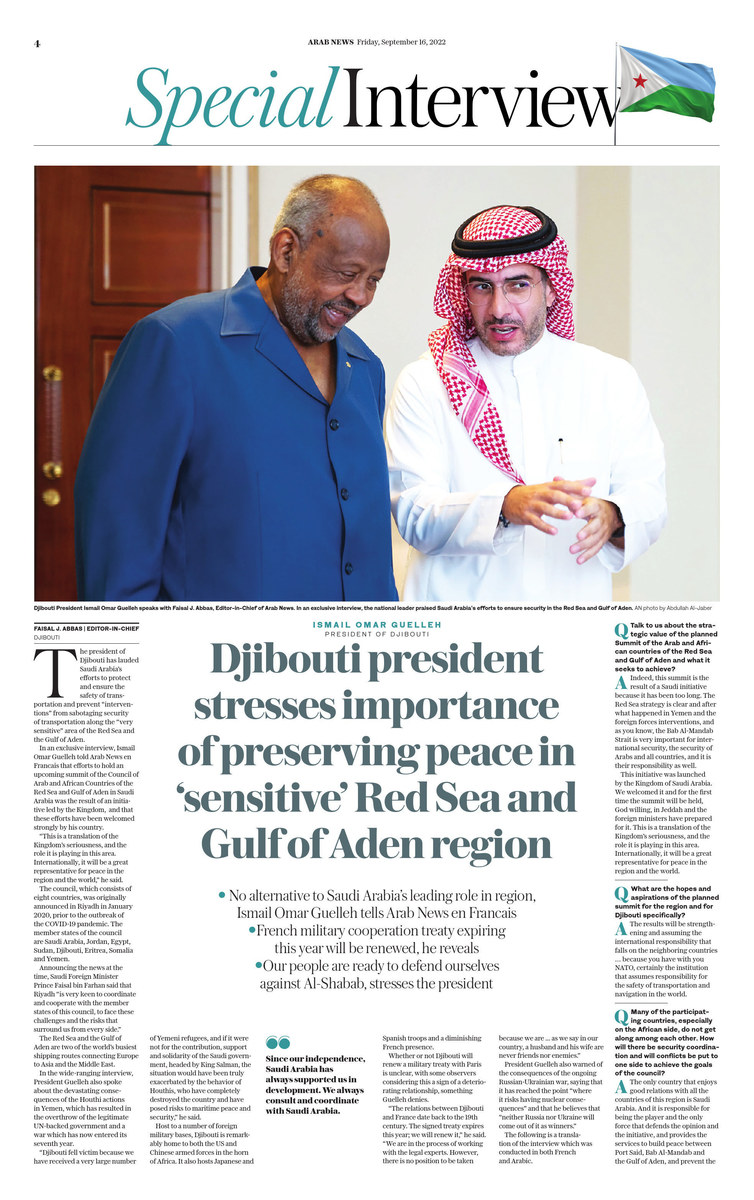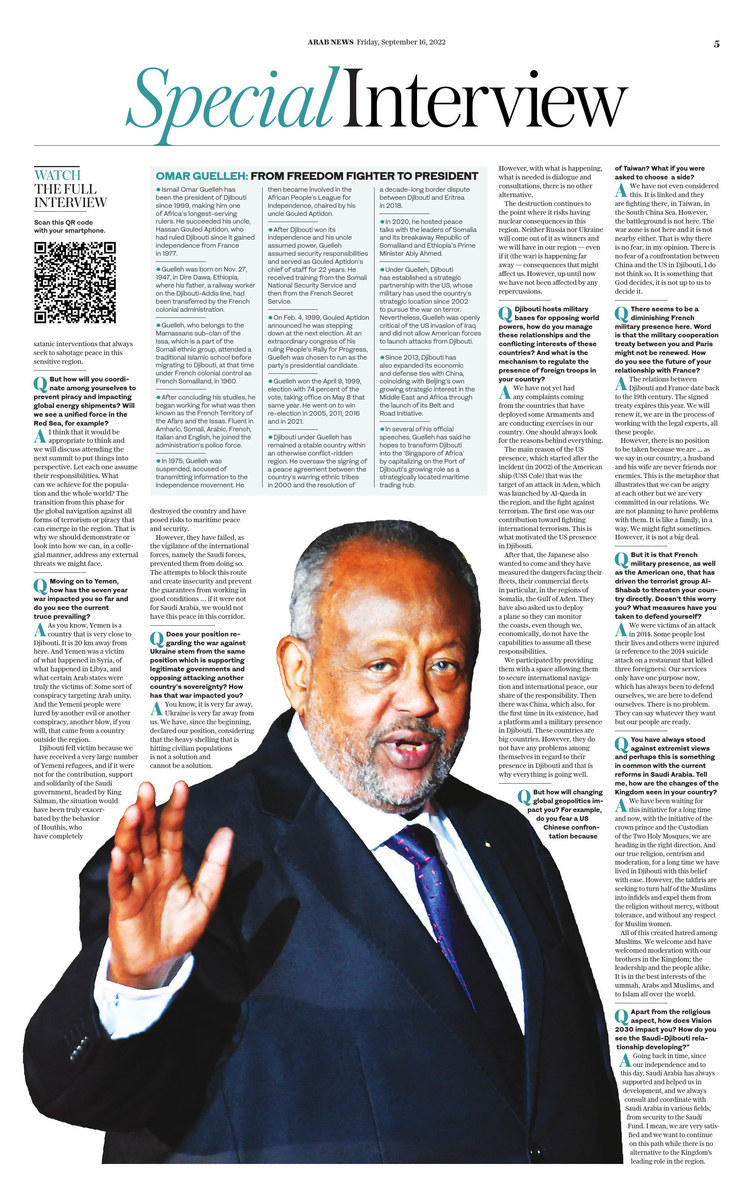• No alternative to Saudi Arabia’s leading role in region, Ismail Omar Guelleh tells Arab News en Francais
• French military cooperation treaty expiring this year will be renewed, he reveals
• Our people are ready to defend ourselves against Al-Shabab, stresses the president
DJIBOUTI: The president of Djibouti has lauded Saudi Arabia’s efforts to protect and ensure the safety of transportation and prevent “interventions” from sabotaging security of transportation along the “very sensitive” area of the Red Sea and the Gulf of Aden.
In an exclusive interview, Ismail Omar Guelleh told Arab News en Francais that efforts to hold an upcoming summit of the Council of Arab and African Countries of the Red Sea and Gulf of Aden in Saudi Arabia was the result of an initiative led by the Kingdom, and that these efforts have been welcomed strongly by his country.
“This is a translation of the Kingdom’s seriousness, and the role it is playing in this area. Internationally, it will be a great representative for peace in the region and the world,” he said.
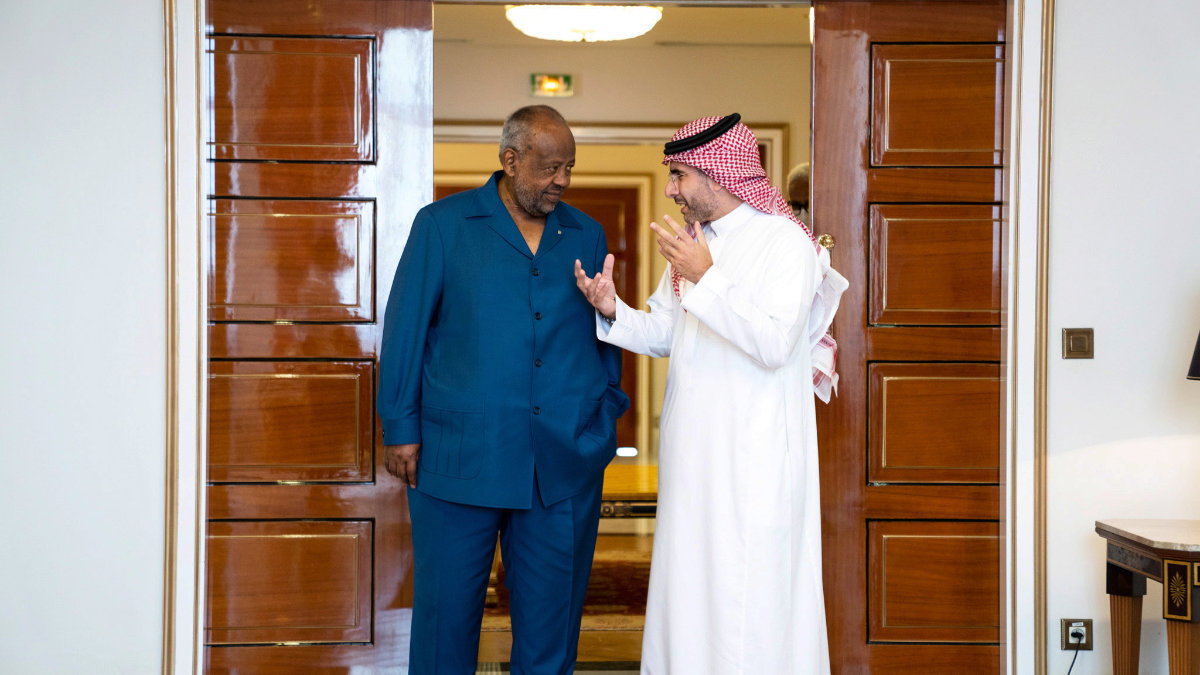
In an exclusive interview with Arab News, Djibouti President Ismail Omar Guelleh praised Saudi Arabia’s efforts to ensure security in the Red Sea and Gulf of Aden. (AN photo by Abdullah Al-Jaber)
The council, which consists of eight countries, was originally announced in Riyadh in January 2020, prior to the outbreak of the COVID-19 pandemic. The member states of the council are: Saudi Arabia, Jordan, Egypt, Sudan, Djibouti, Eritrea, Somalia and Yemen.
Announcing the news at the time, Saudi Foreign Minister Prince Faisal bin Farhan said that Riyadh “is very keen to coordinate and cooperate with the member states of this council, to face these challenges and the risks that surround us from every side.”
The Red Sea and the Gulf of Aden are two of the world’s busiest shipping routes connecting Europe to Asia and the Middle East.
In the wide-ranging interview, President Guelleh also spoke about the devastating consequences of the Houthi actions in Yemen, which has resulted in the overthrow of the legitimate UN-backed government and a war which has now entered its seventh year.
“Djibouti fell victim because we have received a very large number of Yemeni refugees, and if it were not for the contribution, support and solidarity of the Saudi government, headed by King Salman, the situation would have been truly exacerbated by the behavior of Houthis, who have completely destroyed the country and have posed risks to maritime peace and security,” he said.
COUNTRY PROFILE
How Djibouti emerged as a commercial and strategic crossroads of the world
Host to a number of foreign military bases, Djibouti is remarkably home to both the US and Chinese armed forces in the Horn of Africa. It also hosts Japanese and Spanish troops and a diminishing French presence.
Whether or not Djibouti will renew a military treaty with Paris is unclear, with some observers considering this a sign of a deteriorating relationship, something Guelleh denies.
“The relations between Djibouti and France date back to the 19th century. The signed treaty expires this year; we will renew it,” he said. “We are in the process of working with the legal experts. However, there is no position to be taken because we are ... as we say in our country, a husband and his wife are never friends nor enemies.”
President Guelleh also warned of the consequences of the ongoing Russian-Ukrainian war, saying that it has reached the point “where it risks having nuclear consequences” and that he believes that “neither Russia nor Ukraine will come out of it as winners.”
The following is a translation of the interview which was conducted in both French and Arabic:
Q: Talk to us about the strategic value of the planned Summit of the Arab and African countries of the Red Sea and Gulf of Aden and what it seeks to achieve?
A: Indeed, this summit is the result of a Saudi initiative because it has been too long. The Red Sea strategy is clear and after what happened in Yemen and the foreign forces interventions, and as you know, the Bab Al-Mandab Strait is very important for international security, the security of Arabs and all countries, and it is their responsibility as well.
This initiative was launched by the Kingdom of Saudi Arabia. We welcomed it and for the first time the summit will be held, God willing, in Jeddah and the foreign ministers have prepared for it. This is a translation of the Kingdom's seriousness, and the role it is playing in this area. Internationally, it will be a great representative for peace in the region and the world.
Q: What are the hopes and aspirations of the planned summit for the region and for Djibouti specifically?
A: The results will be strengthening and assuming the international responsibility that falls on the neighboring countries … because you have with you NATO, certainly the institution that assumes responsibility for the safety of transportation and navigation in the world.
Q: Many of the participating countries, especially on the African side, do not get along among each other. How will there be security coordination and will conflicts be put to one side to achieve the goals of the council?
A: The only country that enjoys good relations with all the countries of this region is Saudi Arabia. And it is responsible for being the player and the only force that defends the opinion and the initiative, and provides the services to build peace between Port Said, Bab Al-Mandab and the Gulf of Aden, and prevent the satanic interventions that always seek to sabotage peace in this sensitive region.

Q: But how will you coordinate among yourselves to prevent piracy and impacting global energy shipments? Will we see a unified force in the Red Sea for example?
A: I think that it would be appropriate to think and we will discuss attending the next summit to put things into perspective. Let each one assume their responsibilities. What can we achieve for the population and the whole world? The transition from this phase for the global navigation against all forms of terrorism or piracy that can emerge in the region. That is why we should demonstrate or look into how we can, in a collegial manner, address any external threats we might face.
Q: Moving on to Yemen, how has the seven-year war impacted you so far and do you see the current truce prevailing?
A: As you know, Yemen is a country that is very close to Djibouti. It is 20 km away from here. And Yemen was a victim of what happened in Syria, of what happened in Libya, and what certain Arab states were truly the victims of: Some sort of conspiracy targeting Arab unity. And the Yemeni people were lured by another evil or another conspiracy, another blow, if you will, that came from a country outside the region.
Djibouti fell victim because we have received a very large number of Yemeni refugees, and if it were not for the contribution, support and solidarity of the Saudi government, headed by King Salman, the situation would have been truly exacerbated by the behavior of Houthis, who have completely destroyed the country and have posed risks to maritime peace and security.
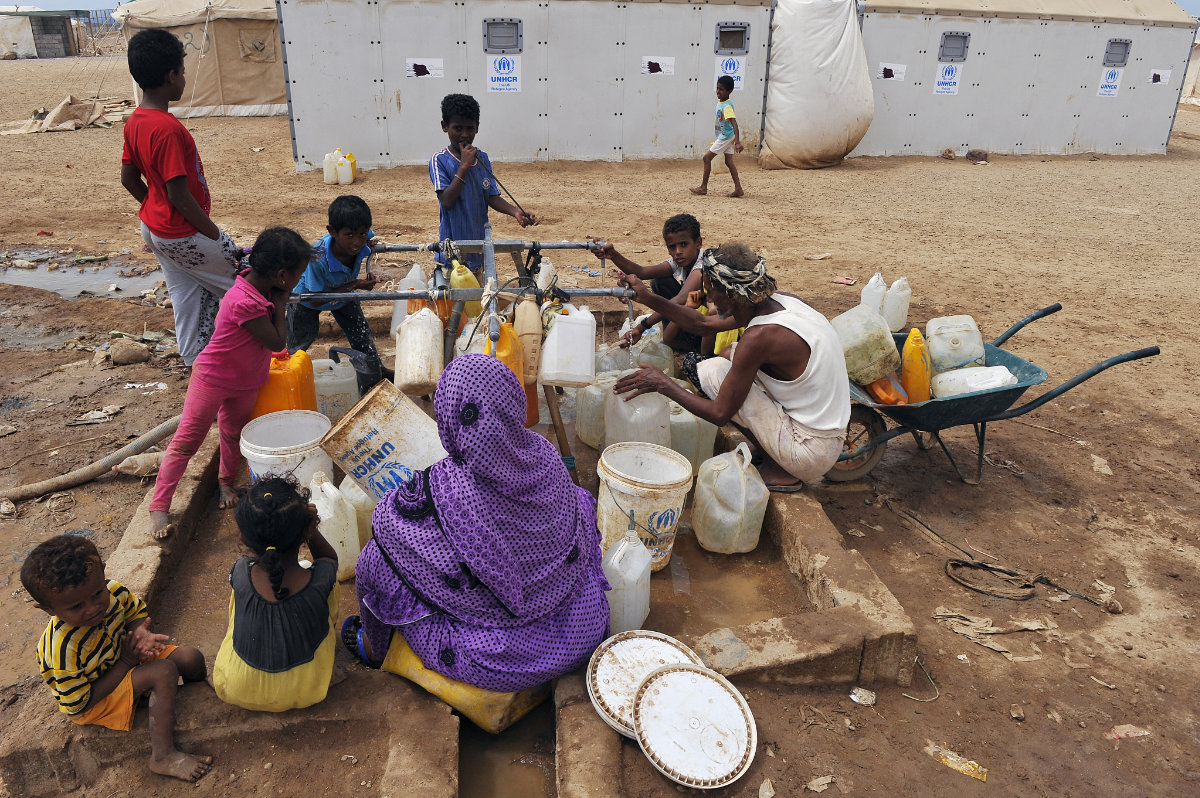
Yemenis displaced by rampaging Houthis fetch water at the UNHCR refugee camp in Obock, Djibouti on March 26, 2016. (AFP file photo)
However, they have failed, as the vigilance of the international forces, namely the Saudi forces, prevented them from doing so. The attempts to block this route and create insecurity and prevent the guarantees from working in good conditions … if it were not for Saudi Arabia, we would not have this peace in this corridor.
Q: Does your position regarding the war against Ukraine stem from the same position which is supporting legitimate governments and opposing attacking another country’s sovereignty? How has that war impacted you?
A: You know, it is very far away. Ukraine is very far away from us. We have, since the beginning, declared our position, considering that the heavy shelling that is hitting civilian populations is not a solution and cannot be a solution. However, with what is happening, what is needed is dialogue and consultations, there is no other alternative.
The destruction continues to the point where it risks having nuclear consequences in this region. Neither Russia nor Ukraine will come out of it as winners and we will have in our region — even if it (the war) is happening far away — consequences that might affect us. However, up until now we have not been affected by any repercussions.
Q: Djibouti hosts military bases for opposing world powers, how do you manage these relationships and the conflicting interests of these countries? And what is the mechanism to regulate the presence of foreign troops in your country?
A: We have not yet had any complaints coming from the countries that have deployed some Armaments and are conducting exercises in our country. One should always look for the reasons behind everything.
The main reason of the US presence, which started after the incident (in 2002) of the American ship (USS Cole) that was the target of an attack in Aden, which was launched by Al-Qaeda in the region, and the fight against terrorism. The first one was our contribution toward fighting international terrorism. This is what motivated the US presence in Djibouti.
After that, the Japanese also wanted to come and they have measured the dangers facing their fleets, their commercial fleets in particular, in the regions of Somalia, the Gulf of Aden. They have also asked us to deploy a plane so they can monitor the coasts, even though we, economically, do not have the capabilities to assume all these responsibilities.
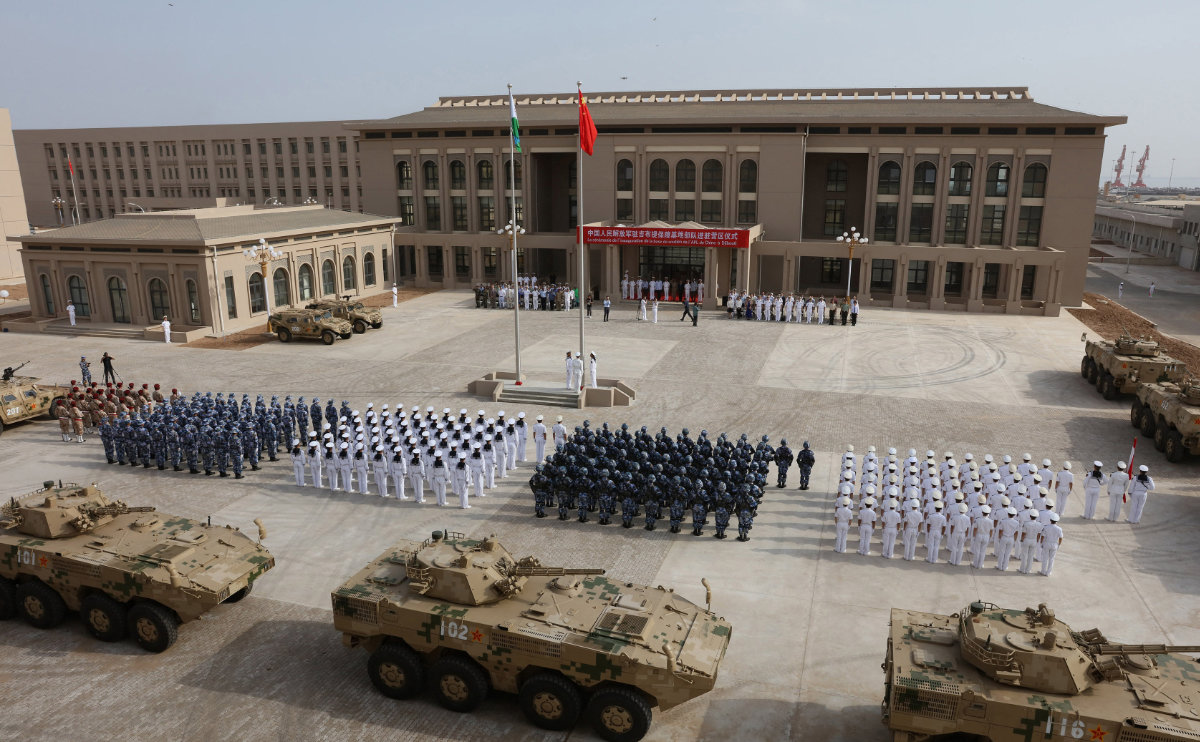
Chinese troops attend the opening ceremony on August 1, 2017, of China's new military base in Djibouti, the Asian superpower's first overseas naval base. (AFP)
We participated by providing them with a space allowing them to secure international navigation and international peace, our share of the responsibility. Then there was China, which also, for the first time in its existence, had a platform and a military presence in Djibouti. These countries are big countries. However, they do not have any problems among themselves in regard to their presence in Djibouti and that is why everything is going well.
Q: But how will changing global geopolitics impact you? For example, do you fear a US-China confrontation because of Taiwan? What if you were asked to choose a side?
A: We have not even considered this. It is linked and they are fighting there, in Taiwan, in the South China Sea. However, the battleground is not here. The war zone is not here and it is not nearby either. That is why there is no fear, in my opinion. There is no fear of a confrontation between China and the US in Djibouti, I do not think so. It is something that God decides, it is not up to us to decide it.
Q: There seems to be a diminishing French military presence here. Word is that the military cooperation treaty between you and Paris might not be renewed. How do you see the future of your relationship with France?
A: The relations between Djibouti and France date back to the 19th century. The signed treaty expires this year. We will renew it, we are in the process of working with the legal experts, all these people.
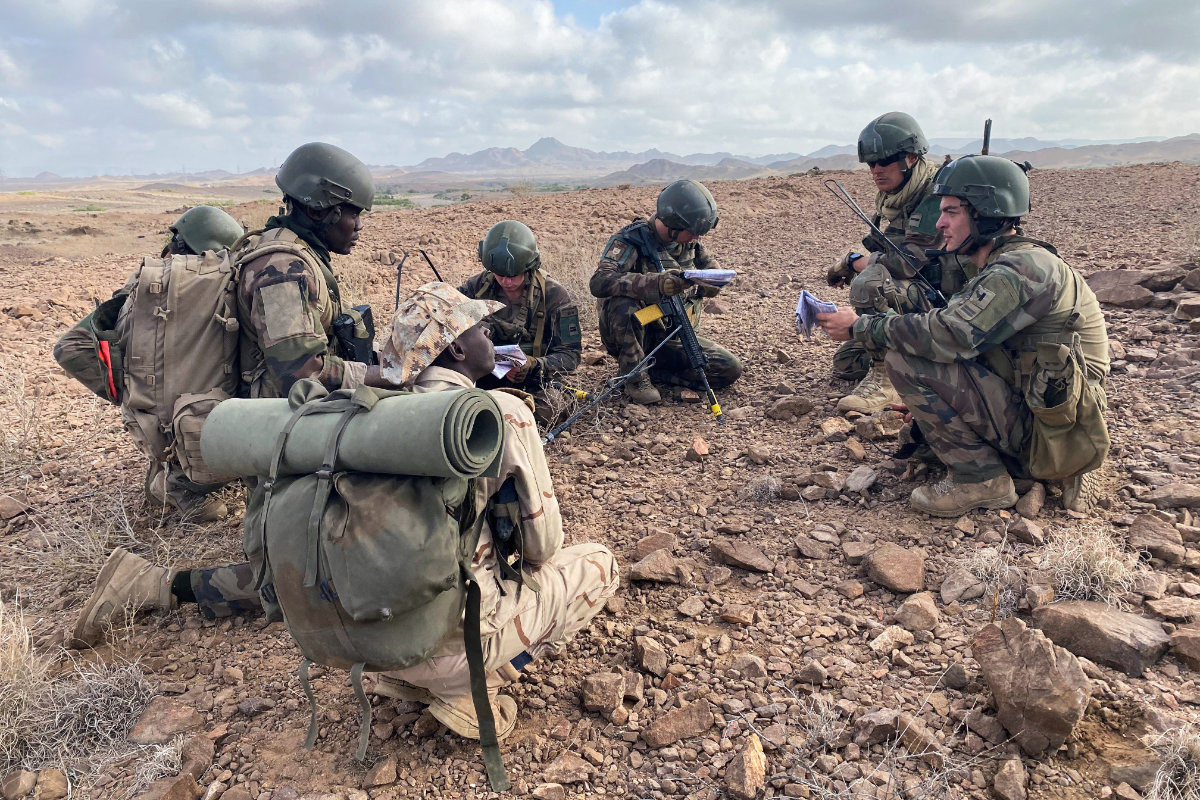
French troops take part in a two-week military training in the desert in Ali Sabieh, Djibouti, on January 30, 2021. (AFP)
However, there is no position to be taken because we are ... as we say in our country, a husband and his wife are never friends nor enemies. This is the metaphor that illustrates that we can be angry at each other but we are very committed in our relations. We are not planning to have problems with them. It is like a family, in a way. We might fight sometimes. However, it is not a big deal.
Q: But it is that French military presence, as well as the American one, that has driven the terrorist group Al-Shabab to threaten your country directly. Doesn’t this worry you? What measures have you taken to defend yourself?
A: We were victims of an attack in 2014. Some people lost their lives and others were injured (a reference to the 2014 suicide attack on a restaurant that killed three foreigners). Our services only have one purpose now, which has always been to defend ourselves, we are here to defend ourselves. There is no problem. They can say whatever they want but our people are ready.
Q: You have always stood against extremist views and perhaps this is something in common with the current reforms in Saudi Arabia. Tell me how are the changes of the Kingdom seen in your country?
A: We have been waiting for this initiative for a long time and now, with the initiative of the crown prince and the Custodian of the Two Holy Mosques, we are heading in the right direction. And our true religion, centrism and moderation, for a long time we have lived in Djibouti with this belief with ease.
However, the takfiris are seeking to turn half of the Muslims to infidels and expel them from the religion without mercy, without tolerance, and without any respect for Muslim women.
All of this created hatred among Muslims. We welcome and have welcomed moderation with our brothers in the Kingdom; the leadership and the people alike. It is in the best interests of the ummah, Arabs and Muslims, and to Islam all over the world.
Q: Apart from the religious aspect, how does Vision 2030 impact you? How do you see the Saudi-Djibouti relationship developing?”
A: Going back in time, since our independence and to this day, Saudi Arabia has always supported and helped us in development, and we always consult and coordinate with Saudi Arabia in various fields, from security to the Saudi Fund. I mean, we are very satisfied and we want to continue on this path while there is no alternative to the Kingdom’s leading role in the region.
